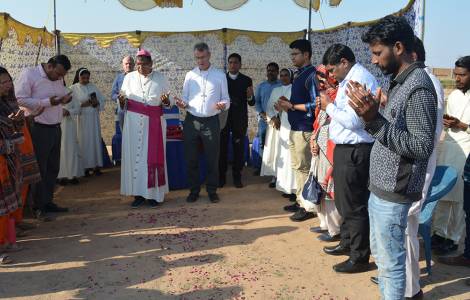
Islamabad (Agenzia Fides) - The pastoral year 2023-2024, which begins next November 26 with the Feast of Christ the King, will be the "Year of the Laity" in the Archdiocese of Islamabad-Rawalpindi. Archbishop Joseph Arshad announced this in a letter distributed to all parishes and the local church. The “Year of the Laity,” it is declared, aims to promote the identity, vocation, mission and witness of the laity in the family, workplace and in Pakistani society to build a more just and cohesive nation. During the liturgical year, each parish, religious order or ecclesial institution should creatively organize liturgical celebrations, conferences and charitable initiatives, starting from the encouragement of the baptized to participate in an authentic experience of faith, enriched today by the fruits of the synodal process of the Church. The focus will be on dialogue as a tool that can contribute to social peace, as well as on the co-responsibility of the laity for the Church's evangelizing mission at the service of all, especially those most in need. Although the Catholic faithful in Pakistan are only a small community (1.5% of the total population), there is great vitality of faith and a significant lay presence and witness. As far as religious practice is concerned, the percentage of believers who regularly attend Sunday services and receive and celebrate the sacraments is approximately 70% of the local Catholic population. Even in situations that are sometimes difficult or marked by suffering, the laity consciously choose to say "Here I am" and to affirm through word and life: "Yes, I want to live my faith. I want to practice my faith and share it with my children and with others". The Archdiocese of Islamabad-Rawalpindi is heavily involved in the social, educational and health sectors, with schools and institutes open to students of all faiths, as well as hospitals and other health facilities. Its social activities cover various areas and include helping poor and vulnerable people thanks to the work of laypeople who take part in children's projects, agricultural assistance programs and interventions for victims of emergencies or natural disasters.
Equally important is the active commitment to interreligious dialogue, which takes place in a "dialogue of life" in society and in everyday life, at the workplace and in interpersonal relationships, and is shaped by lay people. In the “Year of the Laity” we would particularly like to recall the role of the lay ministry of catechists, who make a fundamental contribution to the pastoral work of priests and religious. In the remote areas of the archdiocese - as in other regions of Pakistan - where priests rarely or never arrive, the training of lay people for the ministry of catechesis is essential to keeping the faith alive. After basic theological training, women and men pass on their faith and prepare believers (children, young people, adults) to receive the sacraments and accompany them on their spiritual path. In the light of the Second Vatican Council, the Special Pastoral Year aims to promote more and more the participation of the laity in the life and mission of the Church, also through the support of existing lay movements and associations such as "Jesus Youth", the Focolare Movement , the Community of Sant'Egidio, the Neocatechumenal Way, the Charismatic Renewal, the Secular Franciscan Order and others. In recent years, thanks also to the contribution of the laity, the Pakistani Church has increased its presence in the mass media and evangelization in a "digital" environment. As an "outgoing Church" that opens itself to the world, the Year of the Laity should therefore also be "an opportunity to meet, to listen, to discern together, to put the Gospel into practice in the midst of the great challenges of the present and the future and to proclaim," explains the local church. The “Year of the Laity” will also have a missionary orientation: laypeople will be seen as “subjects” in the “Church on the move”, in the service of the Kingdom of God, in their calling to be “salt of the earth and light of the world” (Mt 5 ,13-14), knowing that they are missionaries in the family and at work, in the places and situations in which they live. During the year, care will be taken to promote the study and reflection of documents of the Church's Magisterium, in particular the Apostolic Exhortation "Evangelii Gaudium" and Pope Francis' "Letter to the Laity" of 2016, in order to encourage the missionary enthusiasm of the laity in the life of the church and also in society. Special attention is paid to the young people, offering them space for communication and interaction about the challenges and personal witness of faith in the Pakistani social fabric, while family pastoral care and the family as a cradle in which faith grows and is nourished, "one "true school of prayer and Christian love" is given the same special attention. The path of the Catholic community in Pakistan, it is affirmed, has benefited and will benefit from "true witnesses and true martyrs" in all areas to "illuminate minds, warm hearts, renew strength to hands and to inspire everyone's steps to live the joy of the Gospel". Among the Pakistani laypeople who have left a deep witness of faith in Pakistani society and politics is the figure of Shahbaz Bhatti, the Catholic minister for minorities who was killed by terrorists in Islamabad in 2011. The Archdiocese of Islamabad-Rawalpindi, with its 43 million inhabitants, the majority of whom are Muslims, has around 220,000 believers spread across 24 parishes. (PA)(Agenzia Fides, 9/11/2023)